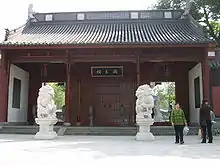Qian Chu
Qian Chu (September 29, 929 – October 7, 988, courtesy name Wende), known as Qian Hongchu before 960, was the last king of Wuyue, reigning from 947 until 978 when he surrendered his kingdom to the Song dynasty.
| Qian Chu 錢俶 | |||||
|---|---|---|---|---|---|
| King of Wuyue (more...) | |||||
| 5th and last king of Wuyue | |||||
| Reign | February 17, 948 – June 9, 978 | ||||
| Predecessor | Qian Hongzong, half-brother | ||||
| Born | September 29, 929 Hang Prefecture, Wuyue | ||||
| Died | October 7, 988 (aged 59) Dèng Prefecture, Song dynasty | ||||
| Spouse |
| ||||
| Issue |
| ||||
| |||||
| Father | Qian Yuanguan | ||||
| Mother | Lady Wu Hanyue | ||||
| Qian Chu | |||||||||
|---|---|---|---|---|---|---|---|---|---|
| Traditional Chinese | 錢俶 | ||||||||
| Simplified Chinese | 钱俶 | ||||||||
| |||||||||
| Qian Hongchu | |||||||||
| Traditional Chinese | 錢弘俶 | ||||||||
| Simplified Chinese | 钱弘俶 | ||||||||
| |||||||||
| Qian Wende | |||||||||
| Traditional Chinese | 錢文德 | ||||||||
| Simplified Chinese | 钱文德 | ||||||||
| |||||||||
Life
Qian Chu came to power after his brother, Qian Zong, was deposed in a coup d'état. At the time, Wuyue was at its largest territorial extent, ruling 13 zhou in modern-day Zhejiang, Jiangsu, Shanghai, and Fujian. Throughout its history, Wuyue maintained a policy of nominally submitting to the successive dominant northern regimes. Unlike the other small states in the south, the Wuyue kings never declared themselves Emperor. In return, the northern regimes respected Wuyue's autonomy and conferred upon its kings high honours, one of which was the title of "Commander of All Horses and Soldiers Under Heaven". Indeed, Qian Chu changed his name from the original Qian Hongchu, because the character hong was barred by taboo (as the name of Emperor Taizu of Song's father was Zhao Hongyin (趙弘殷)).
When the Song Dynasty unified northern China in the 960s, Qian Chu reportedly followed his ancestor Qian Liu's instruction to submit as soon as possible when the "true lord" appeared. In 960, Qian Chu submitted to Song, and changed his name in the same year. Subsequently, Qian Chu obeyed orders from the Song court to participate in the annexation of the other small southern kingdoms on behalf of the Song emperor. In 968, he was re-created the King of Wuyue by the Song emperor, and subsequently invested with further imperial honours. In 977, the new emperor Emperor Taizong of Song invested Qian with the nominal titles Chancellor, Chief Secretary, and Commander of All Horses and Soldiers Under Heaven.
However, in 978, Qian Chu surrendered his territories to the Song regime, possibly under veiled threat from the Song court. Nevertheless, the "voluntary" surrender protected the Wuyue region from the ravages of war that visited other contemporary regimes. The region was able to maintain its infrastructure and economic advantage, built up over the Wuyue period, which in no small part contributed to the Yangtze Delta being the economic centre of China up to the present day.
To allay northern suspicions and prevent conflict, Qian Chu stayed in the Song capital, Bianjing (now Kaifeng), and moved 3000 members of his household there. Qian nominally remained a king. His sons and a large number of the Wuyue elite were given various imperial posts and titles. Initially, Emperor Taizong of Song raised the prefecture of Yangzhou to the nominal state of Huaihai (淮海), and installed Qian Chu as King of Huaihai (淮海国王). In 984, Qian Chu was made King of Hannan (汉南国王) (a smaller nominal feoff) instead, and in 987 reduced again to King of Nanyang (南阳国王), with the right to take up residence in Nanyang, but then immediately additionally created Prince of Xu (许王), with an enlarged feoff. In 988, Qian Chu lost his title as king and was made Prince of Deng (邓王) instead, with a larger nominal feoff and actual income.
Qian Chu reportedly enjoyed a good personal relationship with the emperor, being regularly summoned to the palace for banquets and ball games. On his 60th birthday (by the Chinese calendar) in 988, Emperor Taizong of Song sent him wine as a gift. After drinking the wine, he became violently ill and died that night. He was given a state funeral, posthumously raised to King of Qin, and buried near Luoyang.[1]
Qian Chu had seven sons, one of whom went on to become a Chancellor in the Song court.
Other legacy
Qian Chu enjoyed writing poetry. One of his published poems survives to this day.
Like the other kings of Wuyue, Qian Chu was a devout Buddhist. Leifeng Pagoda in Hangzhou was constructed on his orders to celebrate the conception of his son and in some versions, for Consort Huang.
Personal information
- Father
- Qian Yuanguan (King Wenmu)
- Mother
- Wives
- Major Concubine
- Consort Huang
- Children
- Qian Weizhi (錢惟治) (949-1019), biological son of Qian Hongzong (King Zhongxun), posthumously created the Prince of Pengcheng
- Qian Weijun (錢惟濬) (955-991), heir apparent, posthumously created Prince Anxi of Bin
- Qian Weiyan (錢惟演) (962-1034), later Shumishi during Song, posthumously created the Duke of Ying
- Qian Weixuan (錢惟渲)
- Qian Weihao (錢惟灝)
- Qian Weijin (錢惟溍)
- Qian Weiji (錢惟濟) (978-1032)
References
General
- Mote, F.W. (1999). Imperial China (900-1800). Harvard University Press. p. 15. ISBN 0-674-01212-7.
- New Lin'an editorial team (2004-03-30). "Wuyue's creator - King Qian" (in Chinese). New Lin'an. Retrieved 2007-02-24.
| Regnal titles | ||
|---|---|---|
| Preceded by Qian Hongzong (King Zhongxun) |
King of Wuyue 947–978 |
Succeeded by None (Kingdom absorbed) |
| Ruler of China (Zhejiang/Northeastern Fujian) 947–978 |
Succeeded by Emperor Taizong of Song | |
